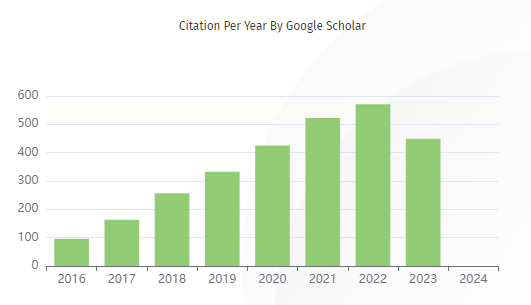Partisipasi Penyusunan Anggaran, Psychological Capital, dan Kinerja Manajerial
DOI:
https://doi.org/10.12695/jmt.2015.14.3.5Abstract
Abstrak. Partisipasi dalam proses penganggaran adalah bentuk keterlibatan nyata seorang individu, yang pada gilirannya akan mempengaruhi kinerja manajerial individu yang bersangkutan. Kinerja manajerial akan efektif jika tujuan anggaran dapat dicapai dan bawahan memiliki kesempatan untuk terlibat atau berpartisipasi dalam proses penyusunan anggaran. Penelitian ini dilakukan untuk mengetahui pengaruh partisipasi anggaran terhadap kinerja manajerial dengan psychological capital sebagai variabel mediasi. Data yang digunakan dalam penelitian ini adalah data primer yang diperoleh melalui penyebaran kuesioner. Responden dipilih dengan metode purposive sampling dengan kriteria sebagai berikut: bekerja dan menduduki jabatan struktural di perguruan tinggi, minimal memiliki satu tahun pengalaman sebagai pejabat struktural, dan terlibat aktif dalam proses penyusunan anggaran. Metode analisis data yang digunakan dalam penelitian ini adalah analisis jalur. Hasil penelitian memberikan bukti empiris mengenai pengaruh positif partisipasi anggaran pada psychological capital, pengaruh positif dari psychological capital terhadap kinerja manajerial, dan pengaruh positif dari partisipasi anggaran terhadap kinerja manajerial. Penelitian ini juga berhasil menunjukkan peran psychological capital sebagai variabel mediasi pengaruh partisipasi penyusunan anggaran terhadap kinerja manajerial.
Kata kunci: Partisipasi Penyusunan Anggaran, Psychological Capital, Kinerja Manajerial, Kuesioner, Pejabat Struktural.
Abstract. Participation in the budgeting process is a form of real involvement of an individual, which in turn will affect the individual's managerial performance. Managerial performance will be effective if the budget goals can be achieved and subordinates have a chance to get involve or participate in the process of budget arrangement. This research was conducted to determine the effect of budget participation on managerial performance with psychological capital as mediating variables. Data used in this research is primary data that obtained through questionnaires. Respondents were selected by purposive sampling method with the following criteria: work and have structural positions in college, at least one year of experience as a structural officials, and actively involved in the budgeting process. The analysis technique used in this study is path analysis. This study provides empirical evidence about the positive effect of budget participation on psychological capital, the positive effect of psychological capital on the managerial performance, and the positive effect of budget participation on the managerial performance. Also this research reveals the role of psychological capital as a mediating variable on the budget participation and managerial performance relationship.
Keywords: Budget Participation, Psychological Capital, Managerial Performance, Questionnaires, Structural Position.
Downloads
References
Afiani, D.N. (2010). Pengaruh Partisipasi Penyusunan Anggaran, Penekanan Anggaran, dan Asimetri Informasi terhadap Senjangan Anggaran. (Studi pada Pemerintahan Kabupaten Semarang). Jurnal Akuntansi Keuangan, 7.
Argyris, C. (1952). The Impact of Budgets on People. New York, NY: The Controllership Foundation.
Bradshaw, J., Hills, J., Hunt, C., Khanna, B. (2007). Working Paper Series, N0. 53. Victoria University of Wellington.
Brownell, P. (1981). Participation in Budgeting, Locus of Control & Organizational Effectiveness. The Accounting Review, 56 (October), 844-860.
Brownell, P. (1982a). Participation in The Budgeting Process: When it Works and When it Doesn't. Journal of Accounting Literature, 1, 124-153.
Brownell, P. (1982b). The Role of Accounting Data in Performance Evaluation, Budgetary Participation and Organizational Effectiveness, Journal of Accounting Research, 20 (Spring), 12-27.
Brownell. P. (1983). Leadership style. Budgetary Participation, and Managerial Behavior. Accounting Organization and Society, 8(4), 307-321.
Brownell. P. & Hirst, M. (1986). Reliance on Accounting Information, Budgetary Participation, and Task Uncertanity: Tests of a Three Way Interaction. Journal of Accounting Research, 24(2), 241-249.
Brownell, P. dan M. McInnes. (1986). Budgetary Participation, Motivation, and Managerial Performance. The Acccounting Review, Vol. LXI (4), October: 587-600.
Chow, C. W., M. D. Shields, & Y. K. Chan. (1991). The Effects of Management Controls and National Culture on Manufacturing Performance: An Experimental Investigation. Accounting, Organizations and Society, 16(3), 209-226.
Chow, C.W., Y. Kato, & M. D. Shields. (1994). National Culture and The Preference for Management Controls: An Exploratory Study of The Firm-Labor Market Interface. Accounting, Organizations and Society, 19(4,5), 381-400.
Chow, C.W., Y. Kato, & K. A. Merchant. (1996). The Use of Organizational Controls and Their Effect on Data Manipulation and Management Myopia: A Japan vs. US Comparison. Accounting, Organizations and Society, 21(2,3), 175-192.
Chow, C.W., M. D. Shields, & A. Wu. (1999). The Importance of National Culture in The Design of and Preference for Management Controls for Multi-national Operations. Accounting, Organizations and Society, 24, 441-461.
Frucot, V., & W. T. Shearon. (1991). Budgetary Participation, Locus of Control, and Mexican Managerial Performance and Managerial Satisfaction. The Accounting Review. 66 (January), 80-98.
Gallani, Susanna, Ranjani Krishnan, Eric J. Marinich, & Michael D. Shields. (2015). Budgetary, Psychological Contracts, and Budgetary Slack. Working Papers 16-017. Harvard Business School.
Ghozali, I. (2011). Aplikasi Analisis Multivariate dengan Program SPSS 19. Edisi 5. Semarang: Badan Penerbit-Universitas Diponegoro. ISBN: 9797040151.
Giri, M.D.B.W. (2014). Pengaruh Partisipasi Penganggaran pada Kinerja Manajerial dengan Keadilan Distributif, Keadilan Prosedural, dan Komitmen Tujuan Anggaran Sebagai Variabel Pemediasi. (Tesis). Universitas Udayana.
Gooty, J., Gavin, M., Johnson, P.D., Frazier, L.M., & Snow, B.D. (2009). In The Eyes of The Beholder: Transformational Leadership, Positive Psychological Capital, and Performance. Journal of Leadership and Organizational Studies. 15(4), 353-367. doi: 10.1177/1548051809332021.
Govindarajan, V. (1986). Impact of Participation in The Budgetary Process on Managerial Attitudes and Performance: Universalistic and Contingency Perspective. Decision Sciences, 17, 496–516. doi: 10.1111/j.1540-5915.1986.tb00240.x.
Indarto, S. L. I. & Ayu, S.D. (2011). Pengaruh Partisipasi Dalam Penyusunan Anggaran terhadap Kinerja Manajerial Perusahaan Melalui Kecukupan Anggaran, Komitmen Organisasi, Komitmen Tujuan Anggaran, dan Managerial Relevant Information. Seri Kajian Ilmiah, 14 (1).
Indriantoro, N. (1993). The Effect of Participative Budgeting on Job Performance and Job Satisfaction with Locus of Control and Cultural Dimentions as Moderating Variables. (Dissertation). University of Kentucky.
Kenis, I. (1979). Effects of Budgetary Goal Characteristics on Managerial Attitudes and Performance. The Accounting Review, 54(4), 702-721.
Kren, L. (1992). Budgetary Participation and Managerial Performance: The Impact of Information and Environmental Volatility. The Accounting Review, 67(3), 511-526.
Larson, M., & Luthans, F. (2006). Potential Added Value of Psychological Capital in Predicting Work Attitudes. Journal of Leadership and Organizational Studies, 13(1), 45-62. doi: 10.1177/10717919070130010701.
Leach-López, M.A., Stammerjohan, W.W., & Lee, K.S. (2007). Budget Participation and Managerial Performance of South Korean Managers Mediated by Managerial Satisfaction and Managerial Relevant Information. 7th Global Conference on Business & Economics, Rome Italy. ISBN: 978-0-9742114-9-7.
Lina & Stella. (2013). Pengaruh Partisipasi Penyusunan Anggaran terhadap Kinerja Manajerial: Kepuasan Kerja dan Job Relevant Information sebagai Variabel Intervening. Jurnal Bisnis dan Akuntansi, 15(1), 37 – 56.
Luthans, F. (2002). Positive Organizational Behavior: Developing and Managing Psychological Strengths. Academy of Management Executive, 16(1), 57-72. doi: 10.5465/AME.2002.6640181.
Luthans, F., Avolio, B.J., Norman, S.M., & Avey, J.B. (2005a). Psychological capital: Measurement and Relationship With Performance and Satisfaction. Gallup Leadership Working Paper, Lincoln, NE. University of Nebraska.
Luthans, F., Avolio, B.J., Walumbwa, F.O., & Li, W. (2005b). The Psychological Capital of Chinese Workers: Exploring The Relationship with Performance. Management and Organization Review, 1, 247-269.
Luthans, F., Youssef, C.M., & Avolio, B.J. (2007). Psychological Capital. Developing The Human Competitive Edge. Oxford, U.K.: Oxford University Press. ISBN 13: 9780195187526.
Luthans, F., Norman, S.M., Avolio, B.J., & Avey, J.B. (2008). The Mediating Role of Psychological Capital in The Supportive Organizational Climate-Employee Performance Relationship. Journal of Organizational Behavior, 29, 219-238. doi: 10.1002/job.507.
Luthans, F. & Avolio, B.J. (2009). The ―Point of Positive Organizational Behavior. Journal of Organizational Behavior, 30, 291–307. doi:10.1002/job.589.
Milani, K. (1975). The Relationship of Participation in Budget-Setting to Industrial Supervisor Performance and Attitudes: A Field Study. The Accounting Review, 4, 274-284.
Mowen, M.M., Hansen, D.R., & Heitger, D.L. (2012). Managerial Accounting: The Cornerstone of Business Decision. South Western Cengage Learning. ISBN: 9780538473477.
Nor, W. (2007). Desentralisasi dan Gaya Kepemimpinan sebagai Variabel Moderating dalam Hubungan antara Partisipasi Penyusunan Anggaran dan Kinerja Managerial. Prosiding Simposium Nasional Akuntansi X.
Nouri, H & Parker, R.J. (1998). The Relationship Between Budget Participation and Job Performance: The Roles of Budget Adequacy and Organizational Commitment. Accounting, Organizations and Society, 23(5/6), 467 – 483.
Parker, S. (1998). Enhancing Role-Breadth Self Efficacy: The Roles of Managerial Enrichment and Other Organizational Interventions. Journal of Applied Psychology, 83(6), 835-852.
Priyatno, D. (2012). Cara Kilat Belajar Analisis Data dengan SPSS 20. Yogyakarta: Penerbit ANDI, 2012. ISBN: 9789792931020.
Rani, M. (2013). Pengaruh Partisipasi Anggaran Terhadap Kinerja Manajerial: Locus of Control sebagai Variabel Moderating. Jurnal Ilmiah Universitas Bakrie, 1 (2).
Sardjito, B., & O. Muthaher. (2007). Pengaruh Partisipasi Penyusunan Anggaran terhadap Kinerja Aparat Pemerintah Daerah: Budaya Organisasi dan Komitmen Organisasi sebagai Variabel Moderating. Prosiding Simposium Nasional Akuntansi X.
Scheier, M.F., & Carver, C.S. (1985). Optimism, Coping and Health: Assessment and Implications of Generalized Outcome Expectancies. Health Psychology, 4(3), 219-247.
Snyder, C.R., Sympsom, S., Ybasco, F., Borders, T., Babyak, M., & Higgins, R. (1996). Development and Validation of The State Hope Scale. Journal of Personality and Social Psychology, 70 (2), 321-335.
Soleha, N, Galih, & Tansil, L. (2013). The Effect of Budgetary Participation on Job Performance with Psychological Capital and Organizational Commitment as an Intervening Variable (Empirical Study on Dinas Pendapatan dan Pengelolaan Keuangan Daerah Districts of Lebak). Prosiding Simposium Nasional Akuntansi XVI – Manado.
Supomo, B. (1996). Pengaruh Struktur dan Kultur Organisasi terhadap Efektivitas Anggaran Partisipatif dalam Peningkatan Kinerja Manajerial: Studi Empiris pada Perusahaan Manufaktur di Indonesia. (Tesis).Universitas Gadjah Mada.
Venkatesh, R & Blaskovich, J. (2012). The Mediating Effect of Psychological Capital on the Budget Participation – Managerial Performance Relationship. Journal of Management Accounting Research, 24(1), 159-175.doi: http://dx.doi.org/10.2308/jmar-50202.
Veronica, A & Krisnadewi, K.A. (2009). Pengaruh Partisipasi Penganggaran, Penekanan Anggaran, Komitmen Organisasi, dan Kompleksitas Tugas terhadap Slack Anggaran pada Bank Perkreditan Rakyat (BPR) di Kabupaten Bandung. Jurnal Akuntansi dan Bisnis, 4(1).
Wagnild, G.M., & Young, H.M. (1993). Development and Psychometric Evaluation of The Resiliency Scale. Journal of Nursing Management, 1(2), 165-178.
Warindrani, A.K. (2006). Akuntansi Manajemen. Edisi 1. Cetakan 1. Yogyakarta: Graha Ilmu. ISBN: 978-979-756-173-4.
Downloads
Submitted
Accepted
Published
How to Cite
Issue
Section
License

This work is licensed under a Creative Commons Attribution-NonCommercial-ShareAlike 4.0 International License. Copyright @2023. This is an open-access article distributed under the terms of the Creative Commons Attribution-NonCommercial-ShareAlike 4.0 International License (http://creativecommons.org/licenses/by-nc-sa/4.0/) which permits unrestricted non-commercial used, distribution and reproduction in any medium.

















